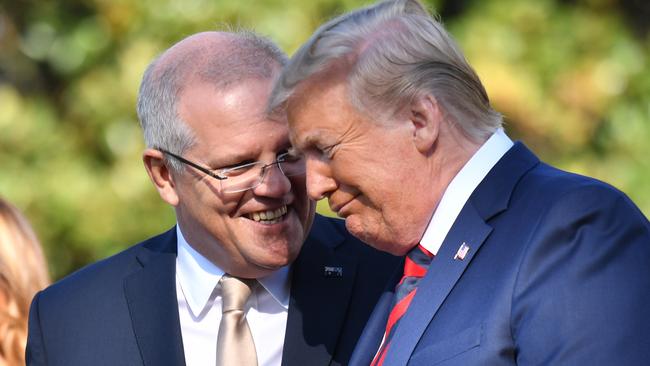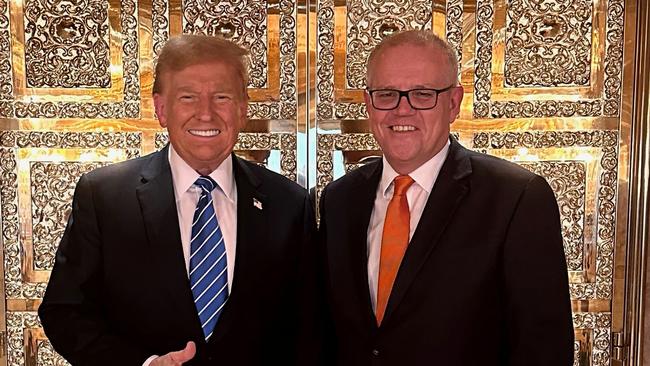Scott Morrison dismisses Donald Trump fears as ‘hot air’
Scott Morrison has dismissed widespread fears of a second Trump presidency as ‘hot air and hyperventilation’, but argues Australia will have to be ‘on its game’ to manage the relationship.

Scott Morrison says fears in Australia of a Trump 2.0 presidency are the result of “hot air and hyperventilation”, but argues the nation will have to be “on its game” if the Republican candidate returns to the White House.
As Anthony Albanese and many of his global counterparts cross their fingers for a Kamala Harris victory next week, the former prime minister told The Australian there was no cause for concern over the future of the alliance or the AUKUS submarine pact under a re-elected Donald Trump.
But he said Australia would have to wait and see how it would be affected by Mr Trump’s promised tariff hikes, and warned Labor would have to dramatically recalibrate its diplomacy to deal with his “unorthodox approach” to international relations.
“Australia has to be on its game in terms of how it manages the relationship, as is always the case,” he said. “When there was a change of government last time there was a change in approach and direction, and we responded to that.”
Analysts have warned of difficult times ahead if Mr Trump is re-elected, while a recent Lowy Institute poll found 73 per cent of Australians would prefer a Harris win on November 5.
But Mr Morrison said Australia had done well under the first Trump administration and could expect to do so again.
“There’s just no real basis to why the concern would be there on the things that matter most to us, which are about the alliance and AUKUS,” he said.
“He’s on the record of supporting the alliance strongly and the genesis of AUKUS was under his administration. So I just think there’s a lot of hot air and hyperventilation around this, which is certainly not grounded in fact.”

As the Treasury and Reserve Bank brace for the impact of Mr Trump’s promised 10 per cent tariff on all imports and 60 per cent tariff on Chinese goods, Mr Morrison said it was too early to say how Australia would be affected by a second round of America First protectionism.
“I think you’ve got to see what happens and what form it ultimately takes. I mean, Australia has a free-trade agreement with the United States for a start,” he said.
He suggested the threatened tariff onslaught was part of Mr Trump’s deal-making style.
“You’ve just got to look at the difference between the excitement that’s often created around things that he says and does, and the intent, at the end of the day, of what it’s all about.”
The former prime minister’s optimism over the prospect of a second Trump presidency is in stark contrast to the pessimism of longtime analysts of US politics.
Lowy Institute executive director Michael Fullilove said the US was the most important factor in the rules-based order, but Mr Trump did not believe such rules applied to him. “He has spent his whole life flouting the rules. He is not interested in rules, laws, norms or institutions. He’s interested in deals and transactions. So the risks are great.”
Dr Fullilove said Australia’s political leaders would have to “grimace and bear it” if Mr Trump returned to office. “My advice would be don’t sneer at Trump, but don’t gush over him either, because he’s not a figure whose presidency is going to contribute to American greatness,” he said.
United States Studies Centre chief executive Michael Green said Mr Trump had put forward “the most disruptive vision for America’s role in the world of any presidential candidate in the post-war period”. “And if he did all of it, Australia would be in trouble. But he won’t,” Dr Green said.
He said the US congress would almost certainly constrain Mr Trump’s worst instincts.
“I think there will be some tariffs, more on China than on allies. But he’s not going to be able to do what he says,” Dr Green said. “He has a history of talking tough and then backing down.”




To join the conversation, please log in. Don't have an account? Register
Join the conversation, you are commenting as Logout